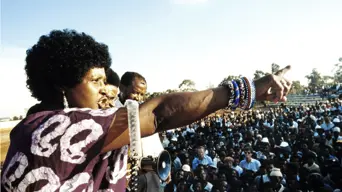INAM KULA | A call for building of a Winnie Madikizela Mandela memorial and museum
'Black women, in particular, have as much claim over the present-day South Africa as anybody else. However, this is not reflected in how women are represented, remembered and regarded,' writes Inam Kula.

FILE: A picture taken on 13 April 1986 shows Winnie Madikizela-Mandela, then-wife of South African president Nelson Mandela and anti-apartheid campaigner, addressing a meeting in Kagiso township. Picture: AFP.
April 2, 2025, officially marked the 7th anniversary of the ‘Mother of the nation’, Winnie Madikizela Mandela’s passing. However, South Africa’s landscape of memory is still extremely biased.
Within our country’s landscape of memory, the role of women is largely veiled.
While the democratic government has made some attempts to address the inherited bias of the previous order, black women have still largely been neglected in this rewriting of our history. The only project/building dedicated to memorialising the role of women in the struggle stands with its doors shut in the country’s capital.
A review of the contents of our history books, the statues that dominate our public spaces, and the museums that house our artifacts indicates a lapse in the collective recognition of iconic figures such as Winnie Madikizela Mandela, Emma Mashinini, Victoria Mxenge, and Rahima Moosa. It is mostly the voices of the South African youth that continue to cry for equal representation.
This tradition of refusing to acknowledge black women must be disrupted.
This exclusion of women from the narrative has far-reaching consequences on the national psyche. It tells us that women have not played any significant role in shaping the world. It tells us that women are weak and are only good as supplements to the men whose names we see displayed before us.
The world has always taught us to remember male bodies first and only after that we can begin speaking about women, when in the truth women have been central in fighting towards a better world.
Black women, in particular, have as much claim over the present-day South Africa as anybody else. However, this is not reflected in how women are represented, remembered and regarded.
The government's current eagerness to express its commitment to gender equality through renaming streets and civic spaces comes across as an afterthought, a negligible hand wave to our failure to pay homage properly.
Time and again, commitments and promises fail to translate into tangible retelling of the freedom struggle narrative and the post-apartheid formation of democracy. It is on this stage that it is important to lay the groundwork for a Winnie Madikizela Mandela Memorial & Museum to fight against forgetting and arrest the general erasure of black women.
Rather than an ersatz reproduction of the struggle hero gallery, this endeavor must provide a space that reimagines how we engage with history.
It must be a space that understands that so much of who we are depends on how we choose to remember our past. The Winnie Madikizela Mandela Memorial & Museum must be cognisant that history has never been neutral; it has always favoured men at the expense of women.
The Memorial & Museum must seek to undo this; it must seek to unshackle history from the system of patriarchy and re-inscribe black women to their rightful place in history and at the same time, celebrate the black women of today who continue to contribute to a more equal society through arts, education, and politics.
Mama Winnie serves as the metaphor for all the black women who fought and sacrificed; for all the black women who were scorned and erased; for all the black women’s voices that were silenced and distorted.
Naming the museum after the struggle stalwart will not only be about remembering the contributions of a single individual but also restoring the many years stolen from the African women's archive.
It will be a reminder that the footprint women made is too immense to be concealed. So, in as much as the Memorial & Museum will honour the legacy of Mama Winnie, it is also a space where women are reminded that they, too, are worthy and have always been worthy.
It will be a space where young women will come and be reminded of their power and capabilities. This living museum must affirm that they come from a rich lineage of women who were not subservient but women who fought, women who were intellectuals, women who mothered the nation and sacrificed everything for us to be here.
It is important to note that there have been other projects that share a commonality with a memorial to Mama Winnie.
Projects preoccupied with the same questions of legacy, remembrance, and justice. A Winnie Madikizela Mandela Memorial must be in conversation with other memorials and museums like the Hector Pieterson Museum and the Mandela House on 8115 Vilakazi Street to collectively engender a holistic account of where this new space can continue to educate while filling the voids of gender representation and present-day activism. A collective approach will help bridge the gaps in our history and speak to the silences in our past.
The sustenance and preservation of the different histories and cultures in South Africa must remain central to the approach, and this memorial must seek to reflect the culture and unique identity represented by all women across our country. It must be inspired and have attributes such as how Mama Winnie Madikizela Mandela oozed pride about her identity, belonging and self-expression
Any project of this scale is not only an investment in education but should also have concrete economic benefits to local people and should, as a principle, seek to use locally available materials, skills, and crafts to develop a contextual representation of this important figure.
The Winnie Mandela Memorial Museum should stand as the last ‘robing’ of Mama Winnie in celebration of her life and to honour her legacy.
Inam Kula – Member of the EFF, Central Command Team